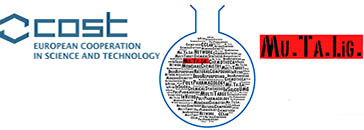
General information
| Name: Ioannis |
| Surname: Trougakos |
| E-mail: itrougakos@biol.uoa.gr |
| Cell phone number with international prefix: +30-210-7274555 |
| Country: Greece |
| Affiliation: National and Kapodistrian University of Athens, Faculty of Biology |
| Gender: F □ M X |
| Year of the PhD title: 1997 |
| Personal web page: http://ipt-mcac.biol.uoa.gr/ |
| Previous COST participation: No □ Yes X |
List of 10 selected publications within last 5 years
| 1. Klionsky DJ et al. Guidelines for the use and interpretation of assays for monitoring autophagy (3rd edition). Autophagy 2016 Jan 2;12(1):1-222. |
| 2. Petrakis TG et al. Exploring and exploiting the systemic effects of deregulated replication licensing. Semin Cancer Biol. 2015 [Epub ahead of print]. |
| 3. Tsakiri EN, Trougakos IP. The amazing ubiquitin-proteasome system: structural components and implication in aging. Int Rev Cell Mol Biol. 2015;314:171-237. |
| 4. Argyropoulou A, Aligiannis N, Trougakos IP, Skaltsounis AL. Natural compounds with anti-ageing activity. Nat Prod Rep. 2013 Oct 11;30(11):1412-37. |
| 5. Tsakiri EN et al. Diet-derived advanced glycation end products or lipofuscin disrupts proteostasis and reduces life span in Drosophila melanogaster. Free Radic Biol Med. 2013 Dec;65:1155-63. |
| 6. Evangelou K et al. The DNA damage checkpoint precedes activation of ARF in response to escalating oncogenic stress during tumorigenesis. Cell Death Differ. 2013 Nov;20(11):1485-97. doi: 10.1038/cdd.2013.76. Epub 2013 Jul 12. |
| 7. Tsakiri EN et al. Proteasome dysfunction in Drosophila signals to an Nrf2-dependent regulatory circuit aiming to restore proteostasis and prevent premature aging. Aging Cell. 2013 Oct;12(5):802-13. |
| 8. Trougakos IP et al. Non-enzymatic post-translational protein modifications and proteostasis network deregulation in carcinogenesis. J Proteomics. 2013 Oct 30;92:274-98. |
| 9. Tsakiri EN et al. Differential regulation of proteasome functionality in reproductive vs. somatic tissues of Drosophila during aging or oxidative stress. FASEB J. 2013 Jun;27(6):2407-20. |
| 10. Sideridou M et al. Cdc6 expression represses E-cadherin transcription and activates adjacent replication origins. J Cell Biol. 2011 Dec 26;195(7):1123-40. |
Main skills and expertise (up to 5)
| 1. Ageing |
| 2. Cancer (Age-related diseases) |
| 3. Molecular-Cellular Biology |
| 4. Proteome stability |
| 5. Natural Products |
Main equipment/facilities available in the participants’ lab (up to 5)
| 1. Imaging (CLSM-TEM) / Cryo-EM sectioning |
| 2. Transgenics |
| 3. Cellular-Molecular Biology / Biochemistry |
| 4. Mammalian cells culture – in vivo models (flies-mice) |
| 5. High throughput microplate reading |
Short personal activity proposal for the COST Action CA15135 (max 1000 characters)
| SPECIALITY/ORIENTATION OF YOUR WORK:
The scientific efforts of the MCAC Group are focusing on the understanding of the molecular-cellular basis of ageing and cancer. Particularly, MCAC focuses on proteome stability alterations during ageing and in age-related diseases, as well as in the discovery of natural compounds that reduce proteome aggregation and prolong proteome stability and longevity at either cell-based and/or at in vivo experimental models. Specifically, we focus on cell signalling pathways and molecular mechanisms involved in proteome maintenance, stability and repair, including the main antioxidant responses (e.g. the Nrf2/Keap1 pathway), molecular chaperones (Clusterin, HSP70, HSF1) and main proteolytic systems (proteasome, lysosome), as well as on their functional alterations and implication in ageing and cancer. Additional areas of ageing- and/or cancer-related research involve the identification of natural and/or synthetic compounds with anti-ageing or anti-tumor activity. Main tools and experimental models include several normal or genetically modified cell lines of mouse or human origin, while for in vivo studies the group is employing Drosophila flies, transgenesis in mice or studies on selected human cohorts. For the COST action CA15135 our main interest will be the selection of biological targets and assessment of biological data.
|
Work Group preference: score from 1 (preferred) to 4 (not preferred)
| Work Group of the CA15135 COST Action | Score |
| WG1: Development of new chemical entities | |
| WG2: Selection of biological targets and assessment of biological data | X |
| WG3: Development of chemical databases | |
| WG4: Development of Computational methods for multiple ligand design and discovery |
